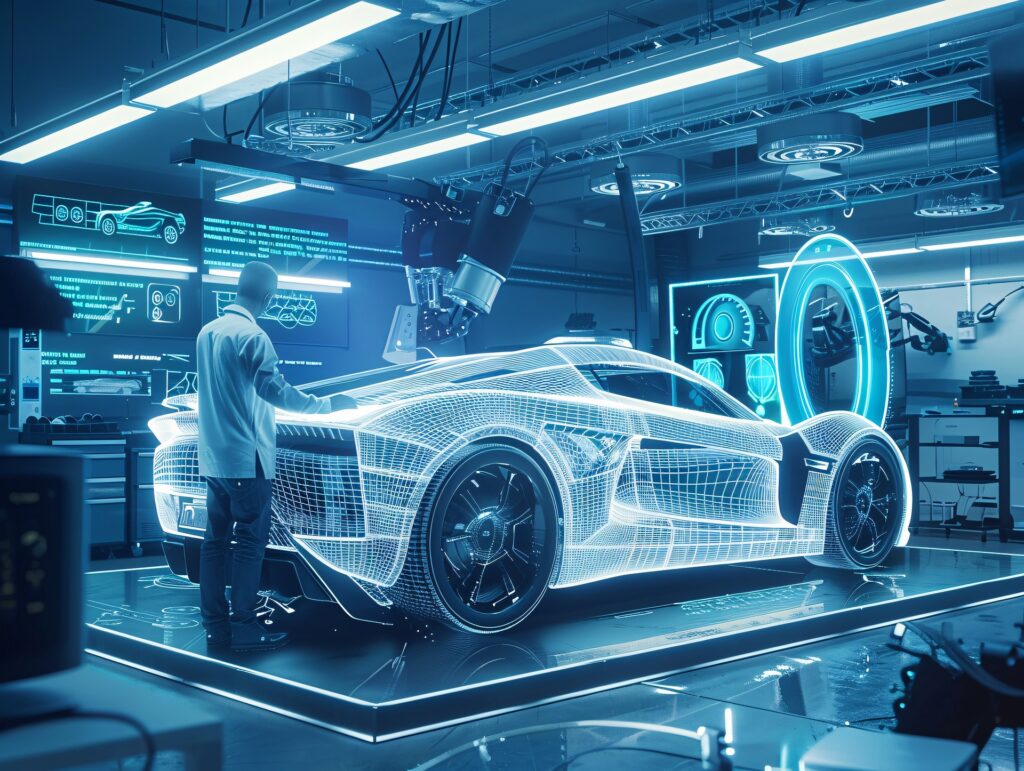Transforming the Automotive Industry with Advanced Technology
“Driving Innovation and Efficiency Through Digital Transformation”
At HMD Technical Services, we are helping automotive companies navigate the rapidly changing landscape of the industry by integrating advanced technology solutions. The automotive sector faces immense pressure to enhance operational efficiency, improve customer experience, and stay competitive in the face of emerging trends like electric vehicles and autonomous driving. This case study explores how we partnered with a leading automotive manufacturer to address key operational and production challenges. By leveraging cutting-edge technology, from automation to AI-driven analytics, we enabled the company to optimize production processes, enhance customer engagement, and drive innovation.

Challenges
Despite being a renowned player in the automotive sector, the company faced several key challenges that hindered its growth and operational efficiency:
- Manual Production Processes: Key manufacturing tasks were still reliant on manual labor, leading to inefficiencies, slower production times, and increased room for human error.
- Supply Chain Inefficiencies: The company’s supply chain management was fragmented, making it difficult to ensure timely deliveries and optimize inventory management.
- Customer Experience Issues: Customers experienced delays in vehicle delivery and had limited interaction with the company post-purchase, impacting overall satisfaction.
- Data Silos: Different departments, including manufacturing, sales, and customer service, maintained separate data systems, making it challenging to gain a comprehensive view of the entire production and sales lifecycle.
Solutions Provided
To overcome these challenges, HMD Technical Services implemented a comprehensive suite of advanced technology solutions designed to optimize manufacturing processes, enhance supply chain management, and improve the customer experience:
Robotic Process Automation (RPA)
We deployed RPA solutions to automate critical tasks across production and supply chain management, including:- Automated Production Line Tasks: Implemented automation on assembly lines, such as welding, painting, and parts assembly, to streamline production processes, reduce errors, and increase output.
- Supply Chain Management: RPA was used to automate order tracking, parts procurement, and inventory management, ensuring seamless communication between suppliers and the production floor.
Artificial Intelligence (AI)
Our AI-driven tools provided valuable insights into both operational and customer-facing processes:- Predictive Maintenance: AI algorithms were integrated to predict machine breakdowns and optimize maintenance schedules, preventing costly downtime on production lines.
- Customer Analytics: Leveraged AI to analyze customer preferences and buying behavior, allowing the company to offer personalized vehicle recommendations and improve the overall sales process.
Cloud Solutions
We migrated the company’s data to a secure, scalable cloud platform, enabling:- Real-Time Data Access: Manufacturing and sales teams gained real-time access to important data, improving collaboration and decision-making across departments.
- Enhanced Data Security: Cloud storage solutions ensured that sensitive information, from manufacturing specifications to customer data, was securely managed and easily retrievable.
Customer Engagement Platform
To enhance customer satisfaction and loyalty, we developed a user-friendly customer engagement platform that:- Streamlined Post-Purchase Services: The platform allowed customers to book maintenance appointments, order spare parts, and access real-time vehicle updates, improving their post-purchase experience.
- Real-Time Communication: Provided direct communication channels between customers and service teams, ensuring timely responses to inquiries and creating a seamless customer journey.
Implementation Timeline
Phase 1: Assessment and Strategy Development (Month 1)
Conducted an in-depth assessment of the company’s existing processes and systems, identifying areas for improvement and devising a tailored digital transformation strategy.Phase 2: Technology Implementation (Months 2-4)
Deployed RPA solutions to automate production and supply chain tasks, integrated AI for predictive maintenance, and began migrating data to the cloud to ensure seamless collaboration.Phase 3: Customer Engagement Enhancement (Months 5-6)
Rolled out the customer engagement platform, enabling a better post-purchase experience and facilitating direct interaction between customers and the company.Phase 4: Continuous Monitoring and Optimization (Month 7)
Monitored the performance of the newly implemented solutions, gathering feedback from both internal teams and customers to ensure ongoing improvements.
